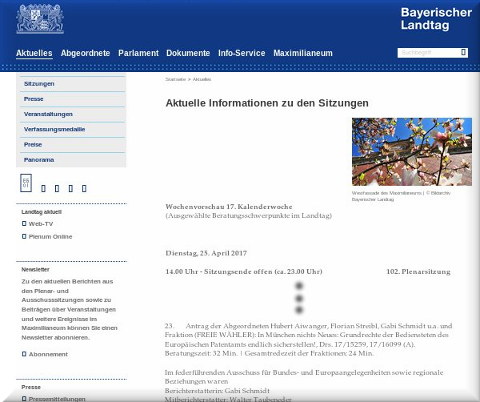

"Meanwhile, as some people have already noticed, Battistelli's political party in France has just lost...""Unfortunately," SUEPO continues, "we cannot inform you on the exact time. We can only inform you that it is motion 23 of 29 motions to be discussed."
We can only wait and hope that someone in Germany (or someone who understands German) will publish the outcome, transcript, etc. We'll happily accept and of course publish anything to that effect if it's sent to us.
Meanwhile, as some people have already noticed, Battistelli's political party in France has just lost (his political affiliation disqualifies him by the way, just like his age, making him strictly unsuitable for his position). Here is a comment posted in relation to the outcome of the election (first round):
Bad evening for Battistelli : crooked Fillon lost it!
Indeed Battistelli placed until very recently, his hope in Fillon's election (they both belong the same political party Les Republicains). He was heard in Munich telling with his usual arrogance that should Fillon win, he would get a three years' extension
well Benoit, time for a change? En Marche back in St Germain !
http://techrights.org/2017/04/23/board-of-epo-and-servregs/
At the same time that the EPO management has relentlessly pushed to speed up processes, it has had maintained a second keen focus on quality, knowing full well that the entire Battistelli experiment could fall apart if the quality of patent examination is seen to suffer.
Ominously, however, as soon as the reforms started taking effect EPO management introduced a new approach to quality measurement that removed many of its independent aspects and put them under the control of the president and his team. In addition, an effort to speed up the process, combined with an aggressive clampdown on staff by management, has undermined the process for critical evaluation of patents.
Previously, the three-person team working on a given patent case would work together and then the chair in each case would do a quick quality check at the end of that process to confirm all was fine.
Under the new system, the chair is expected to weigh in earlier and lodge any concerns in the EPO's Conformity Assurance for Search and Examination (CASE) system before talking to the first evaluator. The subsequent conversation on those points is then also lodged in the system.
The end result of this change is any errors that were previously caught at the earliest stages become a part of the record: so either the first examiner is seen to have made a mistake or the chair is seen to have falsely flagged a problem.
The end result of that, according to internal figures that The Register has seen is that there is less critically analysis being applied to applications rather than more as examiners worry about EPO management blaming them for, ironically, bringing down quality metrics.
Prior to the change, there was a 85-88 per cent conformity rate i.e. agreement between examiners; after the change, a stunning 99 per cent conformity. Battistelli's team, convinced that their pressure tactics are simply causing people to work harder and better, view the results as validating their approach when in reality it undermines it.
But just as the EPO is increasingly unable to keep a lid on the impact of its "early certainty" program, so the knock-on impact on EPO report quality is starting to overwhelm the management's efforts to contain it.
At the last meeting of the EPO's Administrative Council, when the management team outlined their unlikely double-whammy of more patent application approvals while quality also rose, staff union representatives gently suggested that the figures were not showing the full picture.
As I have heard Americans refer to Patent Agents and Patent Atttorneys as "Patent Lawyers", for the benefit of our transatlantic cousins, perhaps Mr. Justice Birss' comment that that "... you don't have to have a science degree to be a great patent lawyer" requires qualification. As far as the UK is concerned, the statement may well be true for someone who wishes to qualify as a Barrister or Solicitor with a view to specialising in Intellectual Property: however, in order to sit the qualifying exams for a UK Patent Attorney or a European Patent Attorney, a degree in Science or Engineering is normally essential. As an exception the EPO does allow candidates who have a technical qualification that is not of the required academic standard may be allowed to sit if they can offer sufficient post-qualification experience in industry.
Comments
katkatkat
2017-04-27 06:48:08